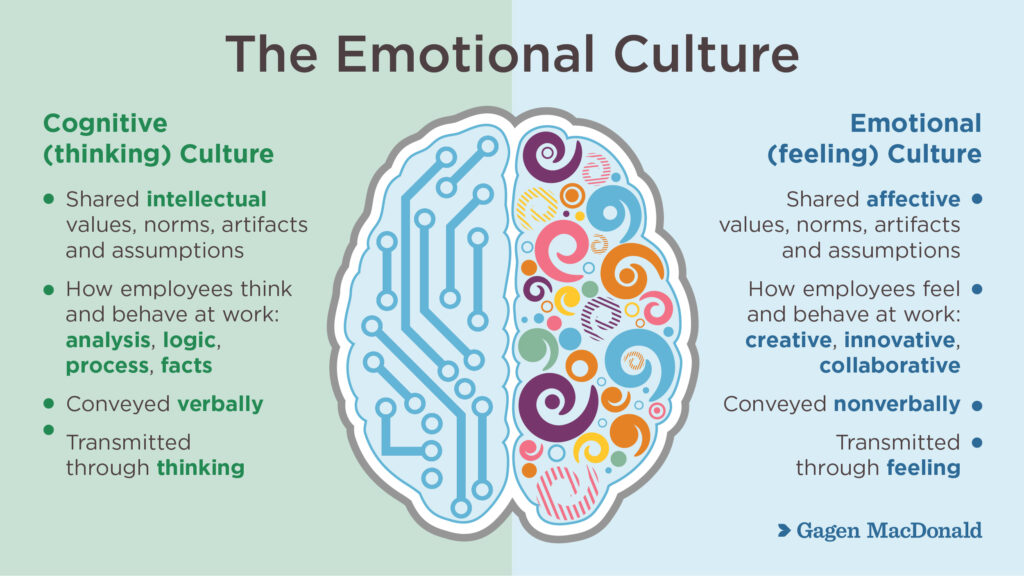Feb 19, 2020
Is There an Emotional Culture? And Why Should We Care?

“Every organization has an emotional culture, even if it’s one of suppression”
Sigal Barsade.
Humans are emotional creatures. At a basic level, we are more emotional animals capable of reason than rational animals capable of emotion. That fundamental truth is born out in decades of research, which – among other findings – shows that emotions drive performance at work. Yet, despite the availability of this knowledge, most organizations manage their cultures more cognitively than emotionally. We present organizations as rational enterprises when the truth is, as humans, we cannot separate our calculative decisions from our intuition. As a consequence, because we suppress the emotional elements of our organizational cultures, in turn, we suppress the passion, creativity, and purpose of our employees. To unleash potential, we must unleash emotion.

Consider this statistic “75% of careers are derailed for reasons related to emotional competencies including: inability to handle interpersonal problems, unsatisfactory team leadership during times of difficulty or conflict, or inability to adapt to change or elicit trust.” Source: Center for Creative Leadership
Organizations sputter because of the human struggle of change. If we rooted our leadership in the knowledge that work is emotional and change produces irrational fears and anxieties, we would reduce the tension our employees experience and boost their commitment and engagement on a massive basis.
As an example, think about how negative emotions are handled in the workplace. When people feel frustration or even anger, employees are typically pressured to bottle or regulate those feelings to exist within rational workplace norms. This can lead to emotional dissonance – the emotion they feel on a gut level becomes at odds with the emotion they’re told is permissible to experience by their employer. When days, weeks, months or years of emotional dissonance pile up, they are likely to lead to emotional exhaustion. Festered, buried feelings eventually lead to a breaking point. People blow up or burnout. On the other hand, organizations that encourage coworkers to be open and honest about their emotions and express them authentically but productively are more collaborative, creative and reliable.
What happens when you, as the leader, do not manage emotions in the workplace?
Our emotions are at the core of everything. Emotions shape our thoughts. Our thoughts drive behavior. And behavior drives results. Emotions = Results. Therefore, when we, as leaders, do not effectively manage emotions in our culture we face significant risks in the workplace such as:
- Lack of urgency
- Lost productivity
- Poor employee engagement
- High employee turnover
- Low quality metrics
- Lack of innovation, creativity and collaboration
So what does this mean for us, as leaders? To change the trajectory of our organization, we must have the courage to both express emotions and be comfortable in their presence. Ignoring or suppressing how you or your employees feel is harmful to your success, your team’s success, and your company’s success.
So how do you start leading with your emotions, encouraging others, and facilitating an emotional culture?
Emotional cultures start at the top with empathetic CEOs. When CEOs model a willingness to give and receive emotion, they set a tone. Emotion becomes infectious. The more executives demonstrate emotional behaviors, the more they encourage them. Transformation occurs.
The most successful organizations integrate both their emotional and cognitive cultures and encourage people to be open and honest about their feelings. As a leader, if you can create an environment where people feel safe expressing their emotions and have the skills to do so in a respectful manner, it will lead to increased:
- Collaboration
- Productivity
- Creativity
- Reliability
- Employee engagement
- Healthy corporate culture
- Accountability
- Strong communication skills
- Trust
- Authenticity
- Integrity
Emotions are always present in the workplace –whether or not we channel them to their most productive and creative use is a choice we can all make. Emotions themselves, do not cause problems: How we handle them does.
Try implementing these quick and easy tips to focus on your emotional culture:
1. Remove fear
Make space for team members to feel safe by creating a sense of belonging – this eliminates any fear of judgement from our minds. Psychological safety encourages people to share their ideas and helps create a more fearless organization.
2. Listen to one another
Take time to listen to other's perspectives. In fact, simply asking people "what do you feel" is a powerful tool to hear what's going on with your team members.
3. Look for negative emotions
It’s natural to suppress negative emotions. However, they can be very telling on what is going on with individuals and teams. Be aware, listen to what your team's negative emotions are telling you.
4. Bring your whole self to work
Lead by example. Be human and vulnerable. The more you model and invite the expression of emotions, your team will show their cognitive and emotional sides too.
5. Take a break
Encourage people to take an emotional break and give them space to share their true feelings. This will lessen pressure and actually increase productivity.
Remember, emotions matter!